Tea is the language through which humans converse with heaven and earth.
Tea is the essence of encounters between humans and nature.
Tea is the bridge connecting people.
May 21 is designated by the United Nations as “International Tea Day.”
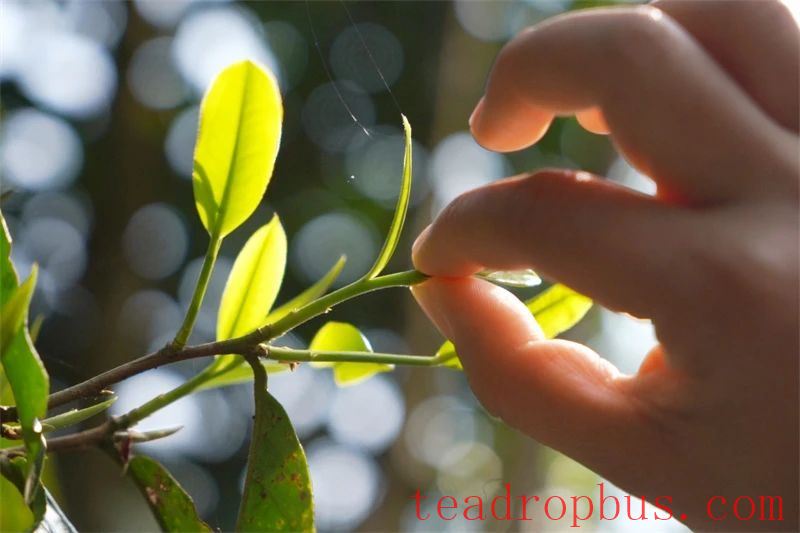
Yunnan Province boasts a rich heritage of Tea culture.
With its unique geographical environment, where one mountain can experience four seasons and conditions can vary dramatically over short distances,
Yunnan produces teas of diverse flavors.
Puer tea, Yunnan black tea (Dian Hong),
are treasures of Yunnan.
“Three-Course Tea,” “Sour Tea,” “Cold-Platter Tea,” “Oil Tea,”
“Bamboo Tube Tea,” “Fresh Bamboo Tea,”
…
are all distinctive tea-drinking customs in Yunnan.
Today, let's explore together how people in Yunnan enjoy their tea in various ways.
Three-Course Tea
The Bai ethnic group's Three-Course Tea from Dali has strict preparation requirements, known as “three courses,” “six rules,” and “eighteen sequences.” At the core are the three stages: bitter, sweet, and reflective.
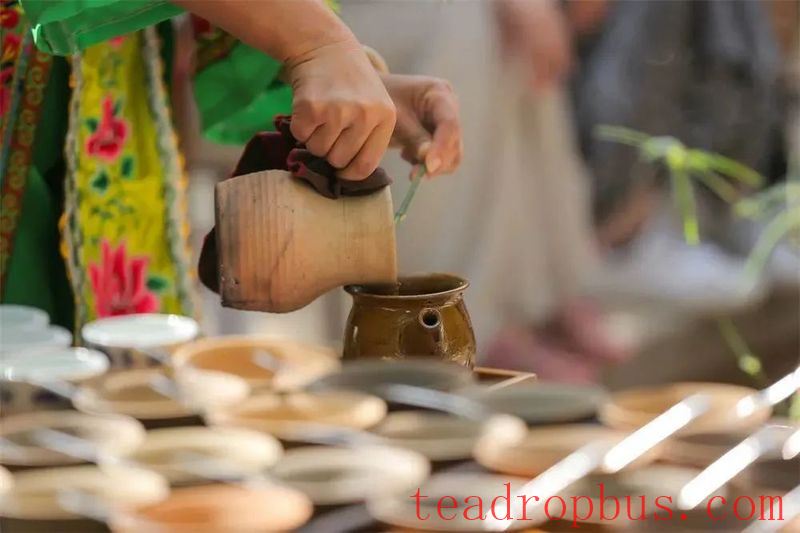
(Photographed by Zhou Lei)
The first course is called “Bitter Tea.” In a Bai family's living room, a black clay pot is placed over a charcoal brazier and slowly heated. The tea leaves are constantly shaken and turned to avoid burning, at least a hundred times. When the leaves turn yellow but not charred, their aroma intensifies. Boiling water is then poured into the pot, causing a loud bubbling sound like thunder, hence this tea is also known as “Hundred-Shake Tea” or “Thundering Tea.”
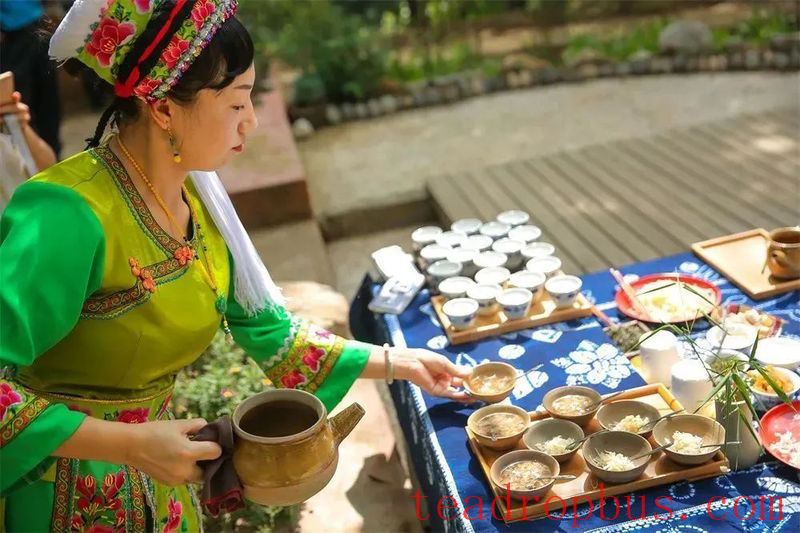
(Photographed by Zhou Lei)
The second course is known as “Sweet tea.” Walnut slices, milk fan shreds, and brown sugar are added as accompaniments, making it sweet but not cloying. This course uses a cup the size of a small bowl, allowing for a hearty drink. Life, like this tea, is sweet after the trials and tribulations of time, rewarding those who have worked hard.
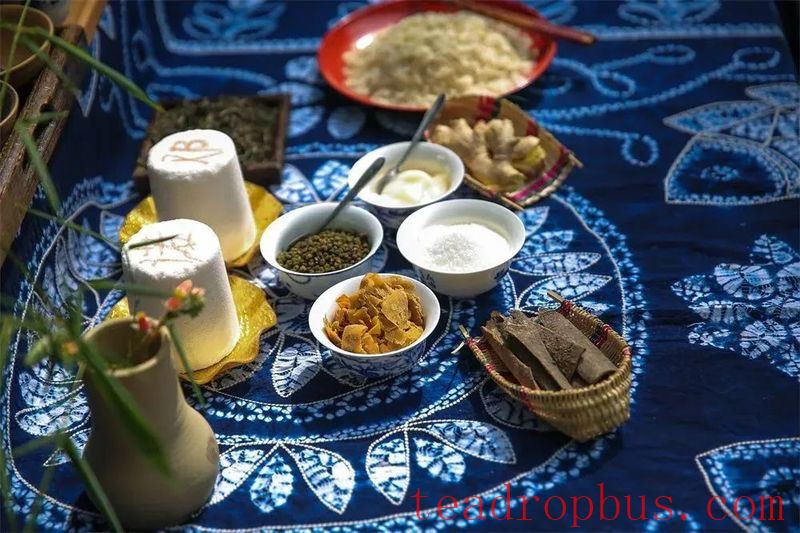
(Photographed by Zhou Lei)
The third course is “Reflective Tea.” Honey, Sichuan pepper, ginger, and cinnamon are mixed with tea and boiled, resulting in a sweet, numbing, fragrant, and spicy concoction that lingers long in the mouth. Cinnamon, being spicy, shares the same pronunciation as “intimacy” in the Bai language, while “ginger” sounds similar to “prosperity.” This course is full of blessings.
The three courses, each with distinct flavors, convey profound life philosophies, coinciding with the “three realms” of life mentioned by renowned scholar Wang Guowei in his book “Words of the Human Realm.”
Sour Tea
The Sour Tea of the De'ang people comes in two forms: edible and drinkable. Edible tea is often served as a dish, a rare delicacy among De'ang cuisine; drinkable tea is sour and slightly astringent, yet finishes with a sweet aftertaste. Its liquor is golden and clear, with older batches developing olive, osmanthus, and dairy aromas.
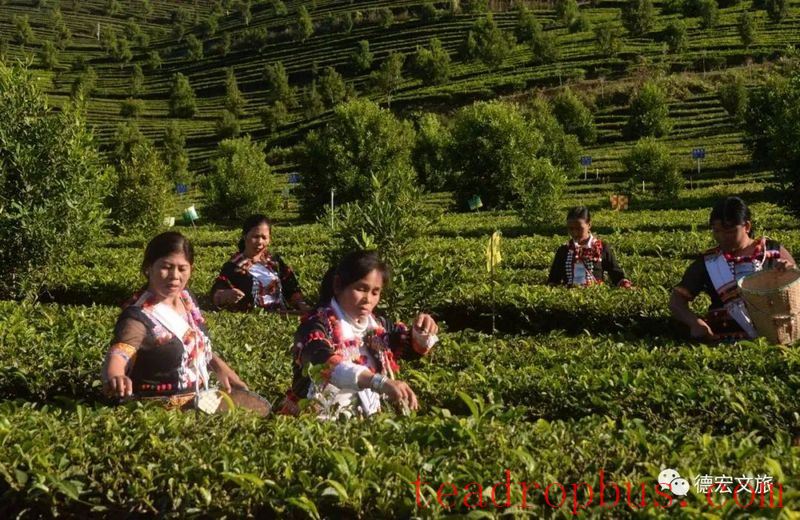
(Provided by the Publicity Department of the Dehong Prefectural Committee)
Each step in the production process of sour tea requires meticulous attention. Freshly picked tea leaves are evenly spread in a wooden bucket and steamed over a fire for 20 minutes. The timing of steaming is crucial. After steaming, the leaves are spread out on a tray to cool completely.
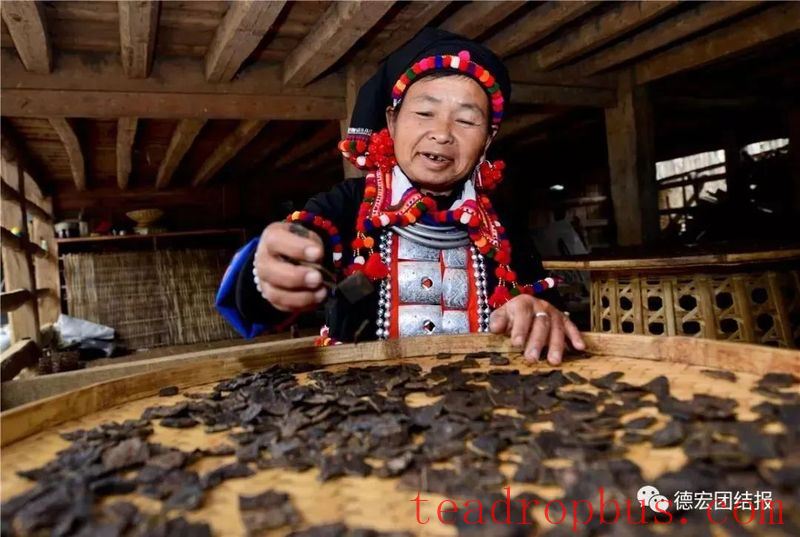
(Photographed by Dong Youxiang)
The tea master personally selects mature bamboo poles that are straight and of suitable size. They are cut into tubes, cleaned inside, and filled with the cooled tea leaves, which are packed tightly layer by layer.
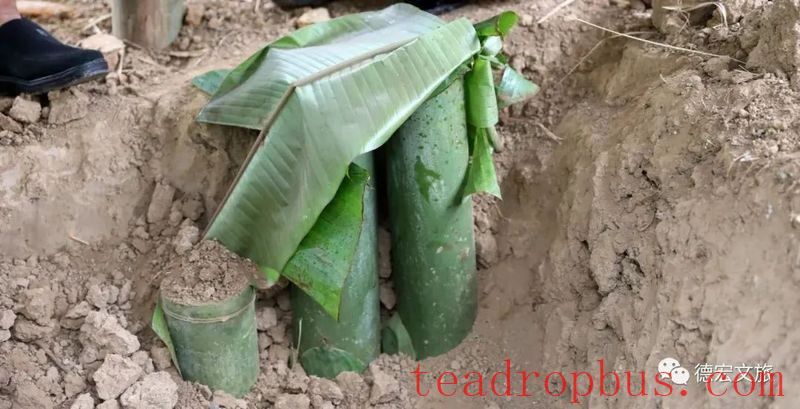
(Photographed by Dong Youxiang)
Once the bamboo tubes are filled, they are sealed with fresh banana leaves. A pit is dug in a cool place, lined with banana leaves, and the sealed bamboo tubes are buried to allow the tea to naturally ferment underground. Depending on light and rainfall, this process takes about 30 to 50 days.
After opening the bamboo tubes, the tea is carefully selected. High-quality sour tea will be a golden color. The Fermented tea is pounded in a stone mortar using a traditional foot-operated pestle, formed into small balls, pressed into cakes, and sun-dried for about two days before being cut into smaller pieces and further dried for five days to produce the final product.
Sour tea can be brewed in clay pots, copper pots, or fresh bamboo tubes, each yielding a different flavor profile. It has a natural mossy and rocky taste, with a special mild sourness and a sweet aftertaste, offering a complex sensory experience.
Cold-Platter Tea
The “Cold-Platter Tea” of the Bulang people is an ancient method of consuming tea, and one of their most distinctive tea-related cultural heritages, also known as “Layou.”
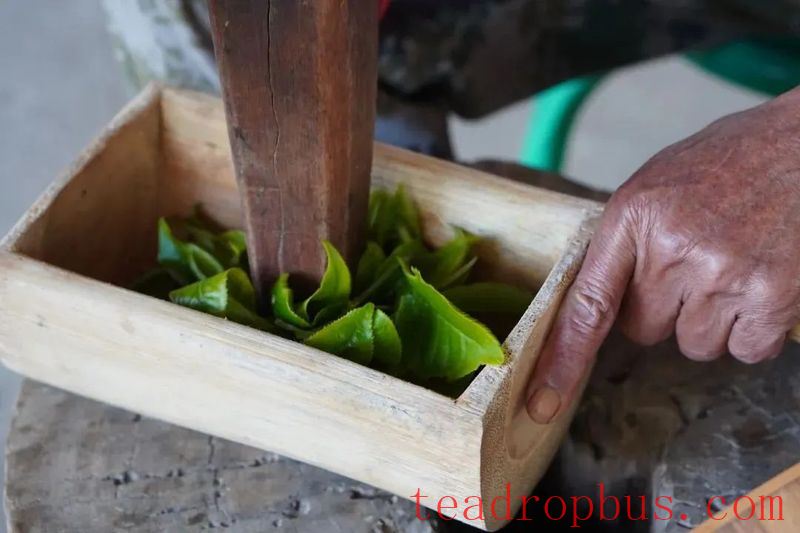
(Provided by the Publicity Department of Xishuangbanna Prefecture, Photographed by Yang Jiajie)
To prepare “Cold-Platter Tea,” young tea leaves, garlic, wild star anise, chili peppers, salt, lemon leaves, and fragrant leaves are pounded together in a mortar. Then, more tea leaves are added and pounded until finely crushed. Finally, water is added to complete the dish. The tea broth is fresh and fragrant, with a delightful aroma upon approach.
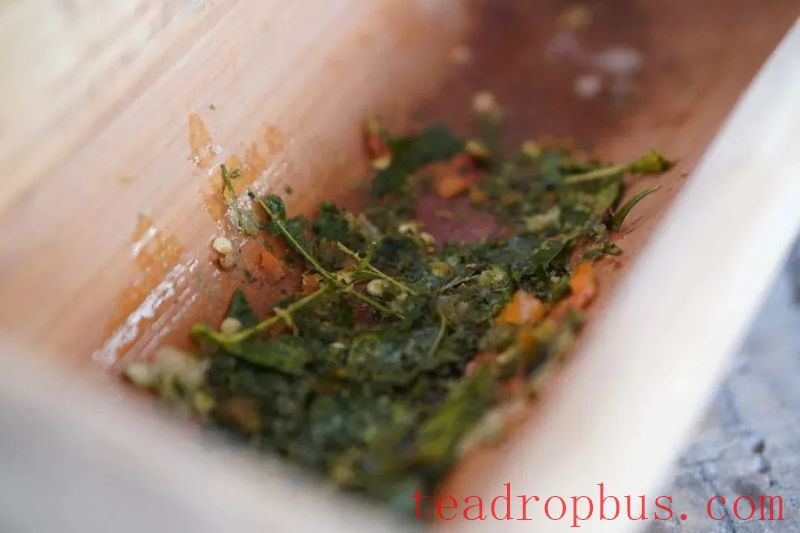
(Provided by the Publicity Department of Xishuangbanna Prefecture, Photographed by Yang Jiajie)
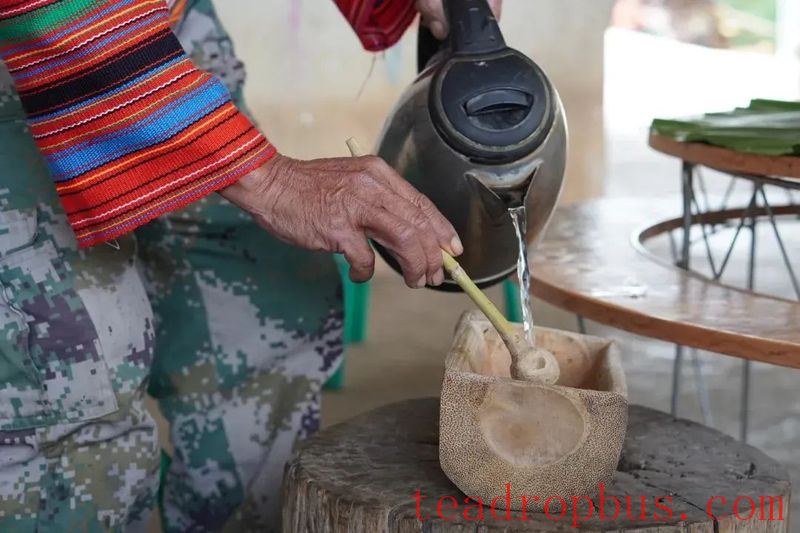
(Provided by the Publicity Department of Xishuangbanna Prefecture, Photographed by Yang Jiajie)
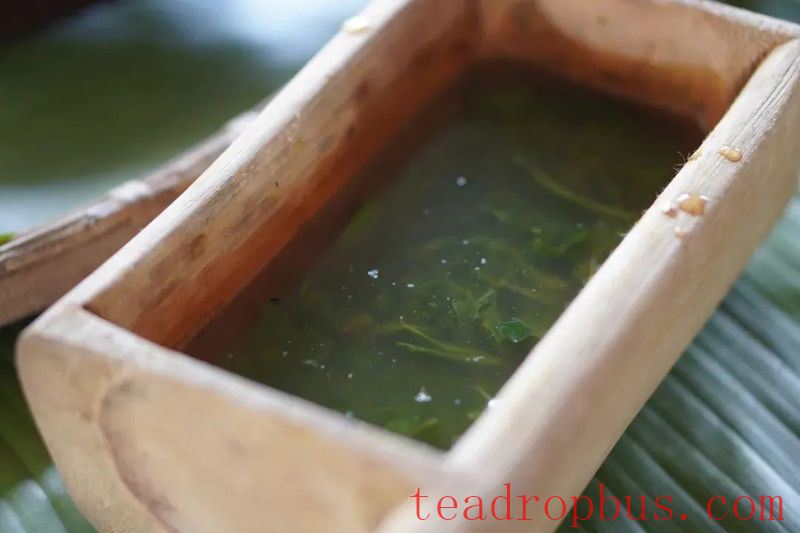
(Provided by the Publicity Department of Xishuangbanna Prefecture, Photographed by Yang Jiajie)
Oil Tea
“Oil Tea” is a specialty of Yongsheng County in Lijiang City. “Oil Tea” is not the same as “Butter Tea”; its taste and preparation method differ greatly from “Butter Tea.”